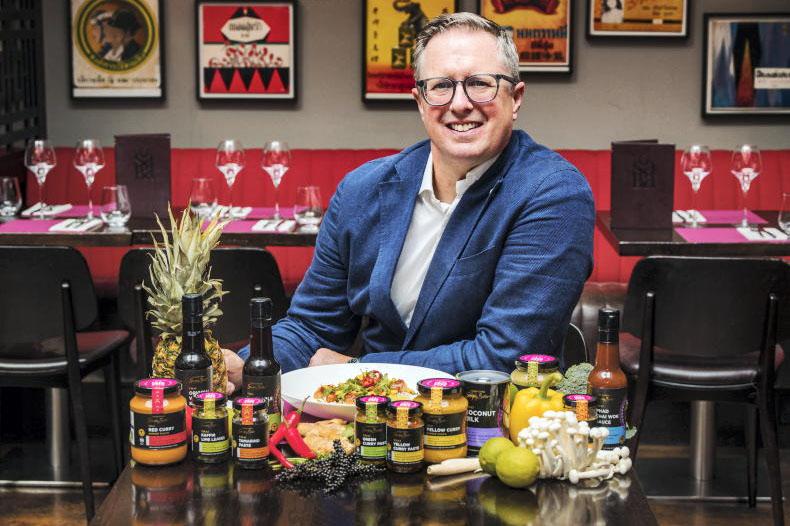The right food is our fuel to run faster, cycle longer, train harder and lift heavier and it applies to all levels of sports, whether you enjoy a brisk walk or you’re a serious athlete. Orla Walsh is a dietitian at OWN clinic who specialises in sports and exercise nutrition.
Orla says the right food isn’t just about sports performance, it’s about enjoyment. “At every level, if you eat better for your sport, you will enjoy it more because the perceived effort will be less. For example, if you’re starting out doing the couch to 5km and you eat properly beforehand, you’ll run without gut issues, your energy will be optimised and you’ll get more from the exercise.”
However, there is a lot of confusion about what eating properly actually means. Let’s bring it back to science, says Orla. “When we are moving slowly, our body mainly uses fat to fuel the process. However, when we are moving really fast, our body is mostly using up carbohydrates. The more we are out of breath, the higher our heartrate is and the longer we are exercising, the more carbohydrates we burn though. So when you’re exercising, you’ll enjoy it more if you have enough carbohydrates running through your blood system and you’re well hydrated.”

Orla Walsh Dietician.
Concentrate on carbs
It’s not a case of loading up on carbs right beforehand though. “Ideally, you would have a good carbohydrate meal about four hours before training and a snack an hour or two beforehand. We want our bellies to be relatively empty so that our blood supply is being diverted to our arms and legs to train harder, rather than being diverted to our bellies to digest food.”
If you’re someone that likes to train first thing in the morning, its often impossible to have a big meal four hours beforehand. In this situation, Orla says: “A lot of people don’t like training on an empty stomach so a small carbohydrate-based snack such as a banana works well. People often perform better with a bit of caffeine so perhaps a coffee en route to the gym. The exception to the rule is if someone is concentrating on a competition first thing in the morning, so for example, you’re running a race or partaking in a cycle. In this scenario, make sure you have a carbohydrate-rich diet the day beforehand so your carb stores are built up.”
The other important time to consume carbohydrates is after training, which Orla calls the ‘carb window of opportunity’. “In the 30 minutes after exercising, any carbohydrates that are consumed go into your muscles and are stored and used the next time you exercise.”
Proper protein intakes
However, there is a lot of consumer confusion over this. Many think it is protein that needs to be consumed immediately after exercise, hence the reason you see so many people gulping back protein shakes after the gym. “You can’t underestimate the importance of protein but the timing isn’t as important. As long as you are getting four good sources of protein throughout the day, that’s what matters.”
Given the focus on protein powders and shakes, Orla explains the science behind it. “Let’s look at milk. The protein in milk is made up of about 20% whey and 80% casein. In the past, manufacturers removed the casein to make cheese and the whey to make animal feed. But then scientists realised that when you look at the building blocks of protein, which are amino acids, one of the most important ones to stimulate muscles is lupin. Whey is really high in leucine and so it is the main ingredient in a lot of protein shakes.”
While the image of protein shakes is often associated with muscly young men working out in the gym, this is not the cohort of people that really need it. Instead, its older people, especially those looking to increase their fitness level. Orla explains, “When you’re older and you don’t do much exercise, you need more leucine to trigger your muscles to repair at a faster pace. These protein powders help you hit your leucine threshold, which is like a light switch turning on muscle building to the maximum.”

Orla says these drinks are also helpful for high-intensity athletes who sometimes can struggle to reach their high calorie thresholds.
But in most scenarios, they are unnecessary, especially for teenagers who would get just as much benefit and even more nutrients from a glass of milk. “Milk has lots of benefits after exercise. It is more hydrating than water it contains protein to repair muscles; water and electrolytes to rehydrate; and carbohydrates to fuel. It also contains a host of vitamins and minerals, including iodine, calcium, phosphorus, B12 and B2. It’s a more complete drink that also benefits your bones for exercising.”
“It’s really easy to stimulate a young person’s muscles to grow and repair so they don’t need whey protein. There are also concerns that they are not using a reputable brand especially if consuming lots of protein powders, and therefore ordering them in bulk on the internet. Some people could be taking in stuff they don’t realise such as hormones and banned substances which is not good. And also if someone is too focused on one nutrient, such as protein, they may be ignoring other nutrients such as carbohydrates which will result in their performance suffering.
Increasing your iron
When it comes to women exercising, Orla says another nutrient to be very aware of is iron. “Every time you run and your foot hits the ground, you lose red blood cells. The longer we run, the more this happens and within a few hours, women may struggle to absorb iron especially due to inflammation in the body. Add this to the fact that women lose blood every month due to their period. And if you’re not absorbing iron, you run the risk of iron deficiency and anaemia.

Orla Walsh Dietician
“Diet plays a key role here and what I suggest for lots of athletes is that rest day is beef day. Beef has lots of iron which is nice and absorbable, and you’ll absorb it better when you’re on a day off from exercise. If you need to take an iron supplement, I would advise to take this first thing in the morning on an empty stomach. Leave 30 to 60 minutes before you have breakfast, tea and coffee so it is absorbed fully. And if you have gut issues when taking an iron supplement, try taking it every other day.”
In general, though, Orla says you don’t need to change your diet massively in order to embrace exercise. “If you keep one thing in mind, its to fill half your plate with fruit and vegetables, a quarter with protein and a quarter with carbohydrates. Stick to this healthy eating advice and you’ll find your performance getting better each time you put on those runners.”
The right food is our fuel to run faster, cycle longer, train harder and lift heavier and it applies to all levels of sports, whether you enjoy a brisk walk or you’re a serious athlete. Orla Walsh is a dietitian at OWN clinic who specialises in sports and exercise nutrition.
Orla says the right food isn’t just about sports performance, it’s about enjoyment. “At every level, if you eat better for your sport, you will enjoy it more because the perceived effort will be less. For example, if you’re starting out doing the couch to 5km and you eat properly beforehand, you’ll run without gut issues, your energy will be optimised and you’ll get more from the exercise.”
However, there is a lot of confusion about what eating properly actually means. Let’s bring it back to science, says Orla. “When we are moving slowly, our body mainly uses fat to fuel the process. However, when we are moving really fast, our body is mostly using up carbohydrates. The more we are out of breath, the higher our heartrate is and the longer we are exercising, the more carbohydrates we burn though. So when you’re exercising, you’ll enjoy it more if you have enough carbohydrates running through your blood system and you’re well hydrated.”

Orla Walsh Dietician.
Concentrate on carbs
It’s not a case of loading up on carbs right beforehand though. “Ideally, you would have a good carbohydrate meal about four hours before training and a snack an hour or two beforehand. We want our bellies to be relatively empty so that our blood supply is being diverted to our arms and legs to train harder, rather than being diverted to our bellies to digest food.”
If you’re someone that likes to train first thing in the morning, its often impossible to have a big meal four hours beforehand. In this situation, Orla says: “A lot of people don’t like training on an empty stomach so a small carbohydrate-based snack such as a banana works well. People often perform better with a bit of caffeine so perhaps a coffee en route to the gym. The exception to the rule is if someone is concentrating on a competition first thing in the morning, so for example, you’re running a race or partaking in a cycle. In this scenario, make sure you have a carbohydrate-rich diet the day beforehand so your carb stores are built up.”
The other important time to consume carbohydrates is after training, which Orla calls the ‘carb window of opportunity’. “In the 30 minutes after exercising, any carbohydrates that are consumed go into your muscles and are stored and used the next time you exercise.”
Proper protein intakes
However, there is a lot of consumer confusion over this. Many think it is protein that needs to be consumed immediately after exercise, hence the reason you see so many people gulping back protein shakes after the gym. “You can’t underestimate the importance of protein but the timing isn’t as important. As long as you are getting four good sources of protein throughout the day, that’s what matters.”
Given the focus on protein powders and shakes, Orla explains the science behind it. “Let’s look at milk. The protein in milk is made up of about 20% whey and 80% casein. In the past, manufacturers removed the casein to make cheese and the whey to make animal feed. But then scientists realised that when you look at the building blocks of protein, which are amino acids, one of the most important ones to stimulate muscles is lupin. Whey is really high in leucine and so it is the main ingredient in a lot of protein shakes.”
While the image of protein shakes is often associated with muscly young men working out in the gym, this is not the cohort of people that really need it. Instead, its older people, especially those looking to increase their fitness level. Orla explains, “When you’re older and you don’t do much exercise, you need more leucine to trigger your muscles to repair at a faster pace. These protein powders help you hit your leucine threshold, which is like a light switch turning on muscle building to the maximum.”

Orla says these drinks are also helpful for high-intensity athletes who sometimes can struggle to reach their high calorie thresholds.
But in most scenarios, they are unnecessary, especially for teenagers who would get just as much benefit and even more nutrients from a glass of milk. “Milk has lots of benefits after exercise. It is more hydrating than water it contains protein to repair muscles; water and electrolytes to rehydrate; and carbohydrates to fuel. It also contains a host of vitamins and minerals, including iodine, calcium, phosphorus, B12 and B2. It’s a more complete drink that also benefits your bones for exercising.”
“It’s really easy to stimulate a young person’s muscles to grow and repair so they don’t need whey protein. There are also concerns that they are not using a reputable brand especially if consuming lots of protein powders, and therefore ordering them in bulk on the internet. Some people could be taking in stuff they don’t realise such as hormones and banned substances which is not good. And also if someone is too focused on one nutrient, such as protein, they may be ignoring other nutrients such as carbohydrates which will result in their performance suffering.
Increasing your iron
When it comes to women exercising, Orla says another nutrient to be very aware of is iron. “Every time you run and your foot hits the ground, you lose red blood cells. The longer we run, the more this happens and within a few hours, women may struggle to absorb iron especially due to inflammation in the body. Add this to the fact that women lose blood every month due to their period. And if you’re not absorbing iron, you run the risk of iron deficiency and anaemia.

Orla Walsh Dietician
“Diet plays a key role here and what I suggest for lots of athletes is that rest day is beef day. Beef has lots of iron which is nice and absorbable, and you’ll absorb it better when you’re on a day off from exercise. If you need to take an iron supplement, I would advise to take this first thing in the morning on an empty stomach. Leave 30 to 60 minutes before you have breakfast, tea and coffee so it is absorbed fully. And if you have gut issues when taking an iron supplement, try taking it every other day.”
In general, though, Orla says you don’t need to change your diet massively in order to embrace exercise. “If you keep one thing in mind, its to fill half your plate with fruit and vegetables, a quarter with protein and a quarter with carbohydrates. Stick to this healthy eating advice and you’ll find your performance getting better each time you put on those runners.”












SHARING OPTIONS